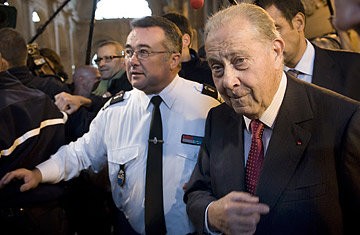
France's former Interior Minister Charles Pasqua arrives at a Paris courthouse for the opening of a trial over a vast France-Angola arms scandal that involves the son of late French President François Mitterrand and dozens of businessmen, politicians and public figures
(2 of 2)
"It is very difficult to stop arms trafficking, because there is no control," says Griffiths, who has researched Ukraine's arsenal for the U.S. government. Although NATO funds Ukraine to destroy its stockpiles, "the Ukrainians realize how much money they can make by selling surplus weapons," he says. In an action that broke no laws, the Ukrainians shipped about 40,000 Kalashnikov rifles to Kenya last year during the tense standoff following the country's disputed presidential election.
As world prices for oil and minerals have soared in recent years, rebel groups in Chad, Sudan, Congo and elsewhere are trading valuable oil and mineral deposits in their regions for arms. Rather than seek the backing of friendly foreign officials — as Dos Santos allegedly did in the mid-'90s — combatants can now bulk up on their own dime. "Each group raises its own funds and then negotiates to buy weapons," says Will Hartley of Jane's Terrorism and Insurgency Center in London. "Gone are the days when governments will send weapons and cash into African states."
That makes arms deals far more difficult to track. But Griffiths says one tactic could work in nabbing arms traffickers: the "Al Capone method." When the U.S. justice system failed to convict the 1930s mobster for racketeering and murder charges, he was finally run in for tax evasion. Griffiths says arms traffickers have one obvious vulnerability: their need to ship arms on boats and planes, most of which require registration. When the E.U. introduced strict safety standards for air-cargo carriers two years ago, its leaders weren't thinking of arms dealers. Yet of the scores of companies they have since cited for violating safety rules, about 80 have been named in U.N. and human-rights reports as known arms shippers. "About 53 companies have been forced to close down," according to Griffiths, who released his findings in a report on Monday. Griffiths says enforcing similar rules against ships could put several arms traffickers out of business entirely. Until then, if you need weapons in Africa, "there are plenty of arms out there — so long as you have the money to pay for it," he says.
